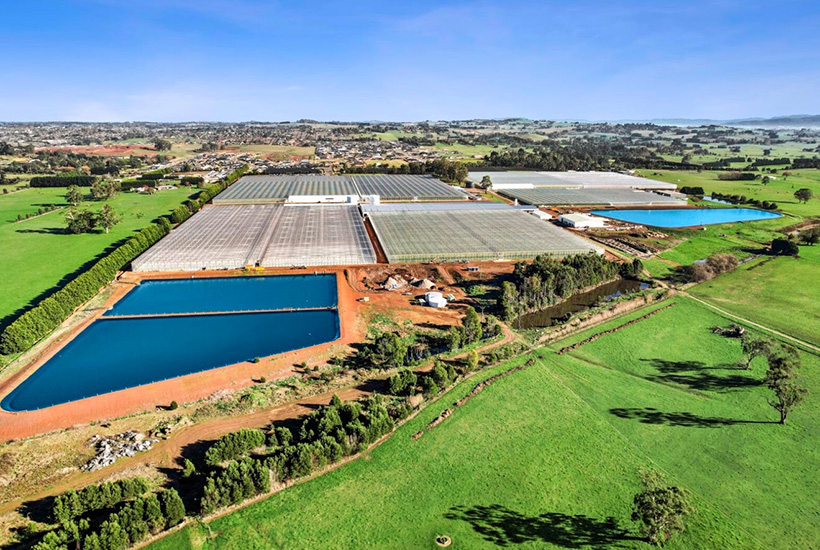Warragul glasshouse on the market in sale and leaseback deal

A major Australian agribusiness is selling its regional Victorian production base in a sale and leaseback deal that could generate $10 million in rental income per annum for the new owner.
Flavorite, a national supplier of fresh produce, operates the 78ha property in Warragul, south-east of Melbourne. It produces tomatoes, cucumbers and capsicum in glasshouses across 38 hectares and a 10-hectare netted blueberry production area. Its major customers include Coles, Woolworths, Aldi and Harris Farm.
Roc Partners bought Flavorite last year as part of its food and agriculture investment platform, but it began life as a family business, with its founders working alongside their families in wholesale markets in Melbourne.
Colliers International Director of Agribusiness James Beer described the investment opportunity as an “attractive 20-year triple net lease with four, five-year options and a commencing rent of $10 million per annum, with fixed increases of 3% per annum.”
The expression of interest campaign is expected to attract offers around $200 million.
According to Colliers, the food producer’s FY22 revenue is expected to be more than $165 million and over $200 million in FY23 on completion of existing projects that include a further 4.4ha of glasshouses on the Warragul site.
“Flavorite has made a long-term commitment to the Warragul Glasshouse, with significant investment in infrastructure on the site in recent years,” Mr Beer said. “The site houses its nursery production and packing operations making it one the region’s largest employers.”
Roc Partners’ investment director, Frank Barillaro said the decision to offer the property via sale and leaseback would enable Flavorite to significantly accelerate its growth program and redeploy funds into additional capex projects, which would create new jobs in regional Victoria. Flavorite’s other Victorian sites are in Katunga, Tatura and Mansfield.
“We are incredibly excited to continue the growth strategy … which is well ahead of plan and on track to make Flavorite a genuine powerhouse in the Australian fresh produce market,” Mr Barillaro said.

Flavourite plans to sell the 78ha site and lease the land back as part of its growth strategy. Picture: realcommercial.com.au/for-sale
Warragul site has landbank potential
The company’s Warragul site is opposite a high-density residential area and the town falls within a state government designated growth corridor, potentially opening future options for the site to be extended beyond agriculture.
“The south-east is regarded as one of the most in-demand growth corridors in the state for residential development, so I think it’s got pretty strong landbank potential, say in 20 years when the lease is up and it may no longer be in a farming zone,” said Mr Beer.
Just 95km from Melbourne, Warragul’s population is closing in on 16,000 and according to the state government Precinct Structure Plan, the town’s future includes 12,500 new houses, four new schools and two new shopping centre.
Mr Beer says Colliers expects there will be strong interest in the Flavorite property from a range of buyers, including institutional investors, agricultural funds and family offices.
He said COVID-19 had failed to put a dent in investment activity in the agribusiness sector, adding it had been “basically business as usual for a lot of our clients, including Flavorite.”
Pandemic sees consumers focus more on fresh produce
Australia’s agricultural sector has been remarkably resilient during the COVID-19 pandemic. While the loss of international travellers and backpackers severely diminished the harvest workforce, the value of fresh produce surged.

Consumers have focused on buying more fresh produce since the pandemic began. Picture: Colliers
According to government agricultural forecaster ABARES, the value of farm produce set a new record in FY21, jumping 7% to $65billion.
The sector also saw an increase in consumer demand for fresh produce. Hort Innovation, a grower-owned research and development company for Australia’s horticulture industry, conducted a survey into consumer behaviour during the COVID-19 pandemic.
The report found between March and December last year, 39% more Australian grocery buyers bought more fresh produce as part of their shop. And 60% of grocery buyers reported that buying Australian-grown product had become more important.
“The pandemic impacted every element of the Australian way of life and drove behaviour change which meant consumers interacted with horticulture through the consumption of fruit, vegetables and nuts with meal preparation at home, through to people spending more time in the garden increasing consumption of nursery items and turf,” Hort Innovation CEO Matt Brand explained.
The Rabobank Agribusiness Outlook for 2021, predicts demand for quality, safe horticultural produce in key markets will remain strong, but COVID-related labour shortages, China trade tensions and issues of climate change will continue to challenge the Australian sector.

The Warragul glasshouse produces tomatoes, cucumbers, and capsicum. There’s also a 10-hectare netted blueberry production area. Picture: realcommercial.com.au/for-sale
“High agricultural commodity prices, low interest rates and positive seasonal conditions are underpinning a positive outlook for most farmers in 2021,” said the report’s author and agribusiness research head Tim Hunt.
“COVID-19 took the headlines from climate in 2020, but it didn’t alter the commitment of key players through the food and agri supply chain to mitigate climate change, prepare for its risk and find mechanisms to reduce and/or recoup the cost of adjustment,” he said.
“If the pandemic wanes in late 2021 as hoped, this quest will again rise to the fore, creating both opportunities and challenges. And it may prove to be the greatest of all transitions facing the sector.”







